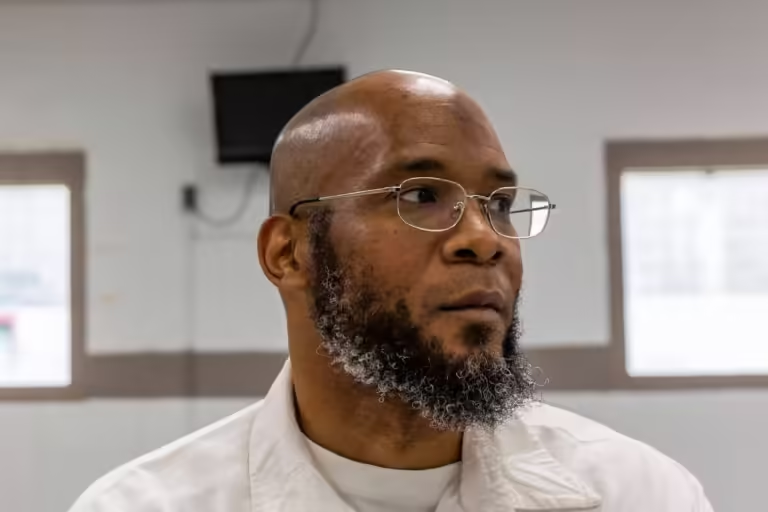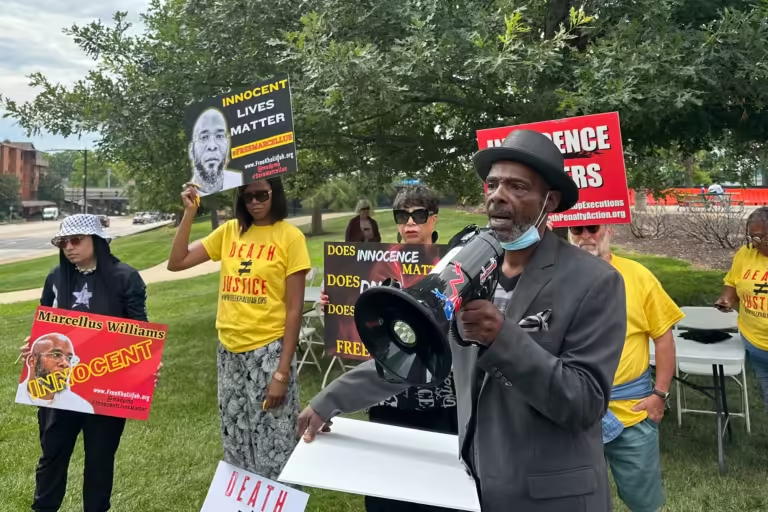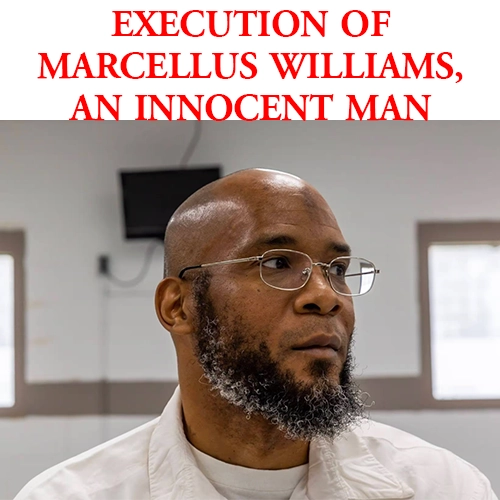Missouri plans to execute Marcellus Williams, despite objections from prosecutors and claims of his innocence.
Prosecutors express concerns over insufficient evidence, while the victim’s family advocates for sparing Williams from the death penalty.

Despite protests from prosecutors who believe he may have been unjustly convicted, a man on death row in Missouri is scheduled for execution on Tuesday.
Marcellus “Khaliifah” Williams, 55, is set to be executed by lethal injection at 6 pm CT, even though the St. Louis County prosecuting attorney’s office, which initially convicted him, has attempted to overturn his case. The prosecutors have expressed doubts due to the absence of DNA evidence connecting Williams to the 1998 murder of Lisha Gayle, and they argue that Williams did not receive a fair trial.
Even though both the prosecutor’s office and the victim’s family supported an agreement to spare Williams from the death penalty, Andrew Bailey, Missouri’s Republican attorney general, has insisted on allowing the execution to go ahead.
“The general public, the victim’s family, and the St. Louis County prosecutor’s office are all against this execution proceeding,” stated Jonathan Potts, a lawyer for Williams, in a Monday interview. “It’s quite shocking and remarkable that the attorney general’s office, which has no involvement in this case, is pushing for his death sentence.”
Williams, who has consistently claimed his innocence, was found guilty of the first-degree murder of Gayle, a social worker and former journalist for the St. Louis Post-Dispatch. Williams was charged with breaking into Gayle’s residence, fatally stabbing her, and taking several of her possessions, yet no forensic proof linked Williams to the murder weapon or location.
Williams, who acts as the imam in his prison and devotes his time to poetry, had his execution postponed twice at the eleventh hour. In January 2015, just days before his scheduled execution, the Missouri State Supreme Court allowed his lawyers additional time for DNA testing. In August 2017, Eric Greitens, the then-Republican governor, issued a stay of execution just hours before it was due to take place, referring to DNA tests on the knife that revealed no traces of Williams’s DNA.
Greitens established a committee to reevaluate the case, but when Mike Parson, the current Republican governor, assumed office, he dissolved that committee and advocated for the execution to go ahead.
In January, Wesley Bell, the Democratic prosecutor in St. Louis known for advocating criminal justice reforms, submitted a motion to reverse Williams’s conviction. Bell pointed to multiple DNA tests that showed Williams’s fingerprints were not present on the knife.
“Significant physical evidence was left behind by Ms. Gayle’s killer. None of this physical evidence can be linked to Mr. Williams,” his office stated, further noting: “New evidence indicates that Mr. Williams is in fact innocent.” Bell also claimed that Williams’s legal representation at the time was inadequate and that his predecessors in the St. Louis prosecutors’ office had wrongfully excluded black jurors from participating in the trial.

Image: Joseph Amrine, who was exonerated two decades ago after spending years on death row, speaks at a rally to support Marcellus Williams on 21 August 2024, in Clayton, Missouri. Photograph: Jim Salter/AP
However, further examination of the knife disclosed that the prosecutors’ office personnel had improperly handled the weapon post-murder—they had touched it barehanded prior to the trial, according to Bell’s office. A forensic specialist testified that this improper handling of the weapon rendered it impossible to ascertain if Williams’s fingerprints might have been present on the knife earlier.
In August, an agreement was reached between Williams and the prosecutors to stop his execution: he would enter a no-contest plea to first-degree murder in return for a new sentence of life imprisonment without the possibility of parole. His attorneys stated that this agreement was not a confession of guilt but was intended to spare his life while he sought new evidence to establish his innocence. The agreement was approved by a judge and the victim’s family, but it was contested by the attorney general and subsequently blocked by the state supreme court.
‘He remains hopeful’
Williams’s legal team on Monday made a plea to halt the execution, arguing that the prosecutor from the 2001 trial had dismissed a Black juror due to his resemblance to Williams. However, this appeal was turned down by the state supreme court. The governor also declined a plea for mercy, which highlighted the opposition of the victim’s family to the execution and cited three jurors from the trial who expressed doubts about the case and backed Williams’s appeal.
The attorney general contended in court that the prosecutor had denied any racial bias in dismissing Black jurors and maintained that there was nothing inappropriate about handling the murder weapon without gloves at that time.
Bailey’s office has also proposed that additional proof indicates Williams’s culpability, such as a statement from a cellmate who claimed Williams admitted his guilt and a declaration from a girlfriend who alleged she saw pilfered goods in Williams’s vehicle. However, Williams’s legal representatives argued that both of these testimonies were untrustworthy, stating that they were from convicted felons and were incentivized to bear witness due to a $10,000 reward offer.
In a statement released on Monday, Parson justified the execution, stating that Williams’s lawyers had attempted to “confuse the issue with DNA evidence, claims that have been consistently dismissed by the courts”. He asserted that Williams had “explored all due process and every legal route,” adding, “The reality is that Mr. Williams has been convicted, not by the governor’s office, but by a jury of his peers, and this has been confirmed by the courts.” A representative for Bailey referred to the state supreme court’s decision that “there is no convincing evidence of actual innocence.”
On Monday evening, Bell stated that the St Louis prosecutor’s office “will persist in doing everything within our power to spare his life”. He further stated: “Even for those who are divided on the death penalty, when there is a hint of doubt about any defendant’s guilt, the irreversible punishment of execution should not be considered.”
Potts, the lawyer representing Williams, expressed that this case would only deepen the public’s distrust in the legal process. He stated, “The only way to restore public faith in the justice system is if the system is prepared to acknowledge its own errors… What the public is witnessing here is the justice system at its most flawed.”
Potts further mentioned that Williams is “an individual who has never lost hope.”
“Whenever he’s had the chance to present evidence of his innocence and demonstrate how his rights were infringed upon to the courts, that’s when I’ve seen him most encouraged… He’s attempting to reconcile and find his own inner peace with what could transpire in the next 24 hours. However, he hasn’t lost hope,” Potts asserted.
Michelle Smith, who shares the directorship of Missourians to Abolish the Death Penalty, mentioned that she has been collaborating with Williams since 2021, viewing him as a guide. She had a recent conversation with him after his relocation to the facility housing the execution chamber. She said, “He’s consistently upbeat. He’s deeply religious and rooted in his faith. He always takes the time to check on others. He was concerned about my well-being, which is just his nature.”
Smith further stated, “He holds a significant place in the hearts of many. He’s a companion, a dad, a granddad, and a child. He’s an educator. He’s a spiritual counselor to numerous young men. His absence would inflict a severe loss on many.”
Smith expressed her hope that his situation would enlighten the public about the ineffectiveness of “capital punishment”.
“I’ve encountered individuals who assert: ‘We mustn’t end the lives of innocent individuals, yet aside from that, I support capital punishment.’ However, if you have faith in the system at all, it implies you’re comfortable with innocent lives being taken because the system is flawed. It will inevitably result in the death of innocent individuals.”
The son of Williams informed a local journalist that he was praying for a “miracle” and planned to be present at the execution: “I will stand firm and assure my father that he is not alone.”
The execution of Williams is one of five planned across the US within a week. On Friday, South Carolina executed a man just days after the state’s primary witness withdrew his testimony.
The Guardian’s independence and open journalism are made possible by the benevolence of over a million readers like you from Morocco. Would you consider backing our cause?
Our funding comes from our readers, not from a billionaire proprietor or shareholders, which allows us to determine our news priorities. This enables us to persistently report with diligence and honesty on the events that are molding our world.
From pivotal elections happening globally to ongoing wars in Sudan, the Middle East, and Ukraine, and the intensifying climate emergency, we have the freedom to boldly scrutinize the wealthy and influential and narrate stories that would otherwise remain untold.



